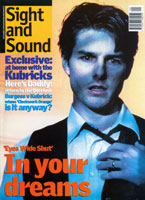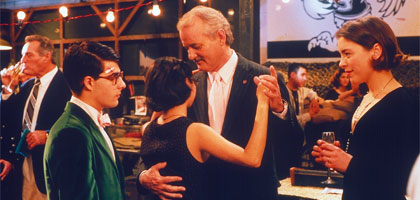Primary navigation

USA 1998

Reviewed by Richard Kelly
Our synopses give away the plot in full, including surprise twists.
Fifteen-year-old Max Fischer is one of the worst students at Rushmore, a prestigious private school. His extracurricular activities lead headmaster Doctor Guggenheim to threaten him with expulsion. Max befriends unhappy industrialist Herman Blume, the school's principal benefactor, then becomes besotted with widowed first-grade teacher Rosemary Cross.
After the premiere of his new play, Max dines with Blume and Rosemary, drunkenly insults her date, and unsuccessfully declares his love. Funded by Blume, Max attempts to build an aquarium in Rosemary's honour on the school's baseball diamond and is consequently expelled.
He enrols at neighbouring Grover Cleveland High, persuades Rosemary to tutor him privately, and ignores the overtures of fellow student Margaret Yang. Blume and Rosemary fall in love. Max's friend Dirk alerts him, and Max informs Blume's wife, who sues for divorce. Max and Blume engage in tit-for-tat hostilities until Max is arrested. Guggenheim has a stroke and, visiting him, Max learns that Rosemary has dumped Blume. Max initiates a truce and convinces Blume to build the aquarium. Rosemary is unconvinced, so Max arranges for her reunion with Blume at the premiere of his new play Heaven and Hell. At the party afterwards, Max and Margaret become an item.
Texan director Wes Anderson and his writing partner Owen Wilson are two of the best things to happen to American film this decade. They first kicked up dust with Bottle Rocket (1996), a low-budget gem which still awaits a UK release. Like Bottle Rocket, Rushmore has three utterly distinctive strengths: a protagonist possessed of unsettling self-assurance, a lovely way with romance, and an inspired soundtrack of offbeat rock and pop.
Bottle Rocket is propelled by Dignan (played by Owen Wilson), an irrepressible borderline psychopath consumed by the pipedream of organising his shiftless pals into a crew of thieves. Rushmore's mettlesome Max Fischer is cut from some of the same cloth: he's "no cynic, no quitter". In Bottle Rocket, love blooms winningly between big, amiable Anthony (played by Wilson's brother Luke) and a lithe Paraguayan motel maid called Inez (Lumi Cavazos). The heart of Rushmore, meanwhile, is the beautifully tentative affair between melancholy Blume and luminous Miss Cross; the courtship of Max and daffy Korean ingénue Margaret Yang is an added treat.
Both films create a plausible yet off-kilter universe; evidently a shared dramatic sensibility is at work. The perks and pitfalls of precocity seem to obsess Anderson and Wilson: their recurrent scene is that of an adult in serious discussion with a preternaturally alert child. In Bottle Rocket, twentysomething Anthony is lectured by his grave prepubescent sister ("What's going to happen to you, Anthony?"). Here, Blume's infidelity earns him a stiff rebuke ("You're a married man, Blume") from Max's chapel partner Dirk, who looks all of 11.
Of course, Max Fischer is himself a compendium of prodigious tendencies, and gives the film a breakneck energy in its first half. But just as we suspect Anderson and Wilson might be overly enamoured of Max, he comes awfully unstuck, and Miss Cross is forced to rebuff him in smarting fashion ("What do you really think is going to happen between us? Do you think we're going to have sex?"). Max's subsequent blue period is the only point where the picture isn't wholly tight, but Bill Murray's Blume is always there for ballast, his wounded mid-life winces seeming to issue from a deep well. "Hey, are you okay?", Max asks him, beginning to sense how real love and real loss might bite. "Oh," Blume murmurs, "I'm a little bit lonely these days." The finale sees Rushmore's slender reality yielding once more to Max's fantasy; but clearly for these young film-makers, that's the point, as underlined in the chorus of the Faces' joyous 'Ooh La-La' which closes the show ("I wish that I knew what I know now / when I was younger").
The cast are all terrific. Jason Schwartzman rises to the challenge of Max with unnerving excellence; Olivia Williams is exquisite as Miss Cross; Murray, for whom Anderson and Wilson wrote the role of Blume, is sublime. Further down the list, Anderson shows every sign of building a repertory company: there are pitch-perfect turns from Deepak Pallana, Kumar Pallana and Andrew Wilson (yes, another brother). Director of photography Robert Yeoman (Rampage, Drugstore Cowboy) has also carried on from Bottle Rocket, as have editor David Moritz, designer David Wasco and costumer Karen Patch: these too look to be fruitful collaborations.
Rushmore is made to be treasured: it feels like an immediate American classic. As a director of wry, wistful, deceptively simple, sharp-edged comedy, Anderson has quickly ascended to the kind of plateau Elaine May reached after her knockout one-two of A New Leaf (1970) and The Heartbreak Kid (1972). Of course, May only directed twice more in the subsequent three decades, proving too smart for her own good. Here's hoping Anderson, Wilson and their happy band know where they're headed next.